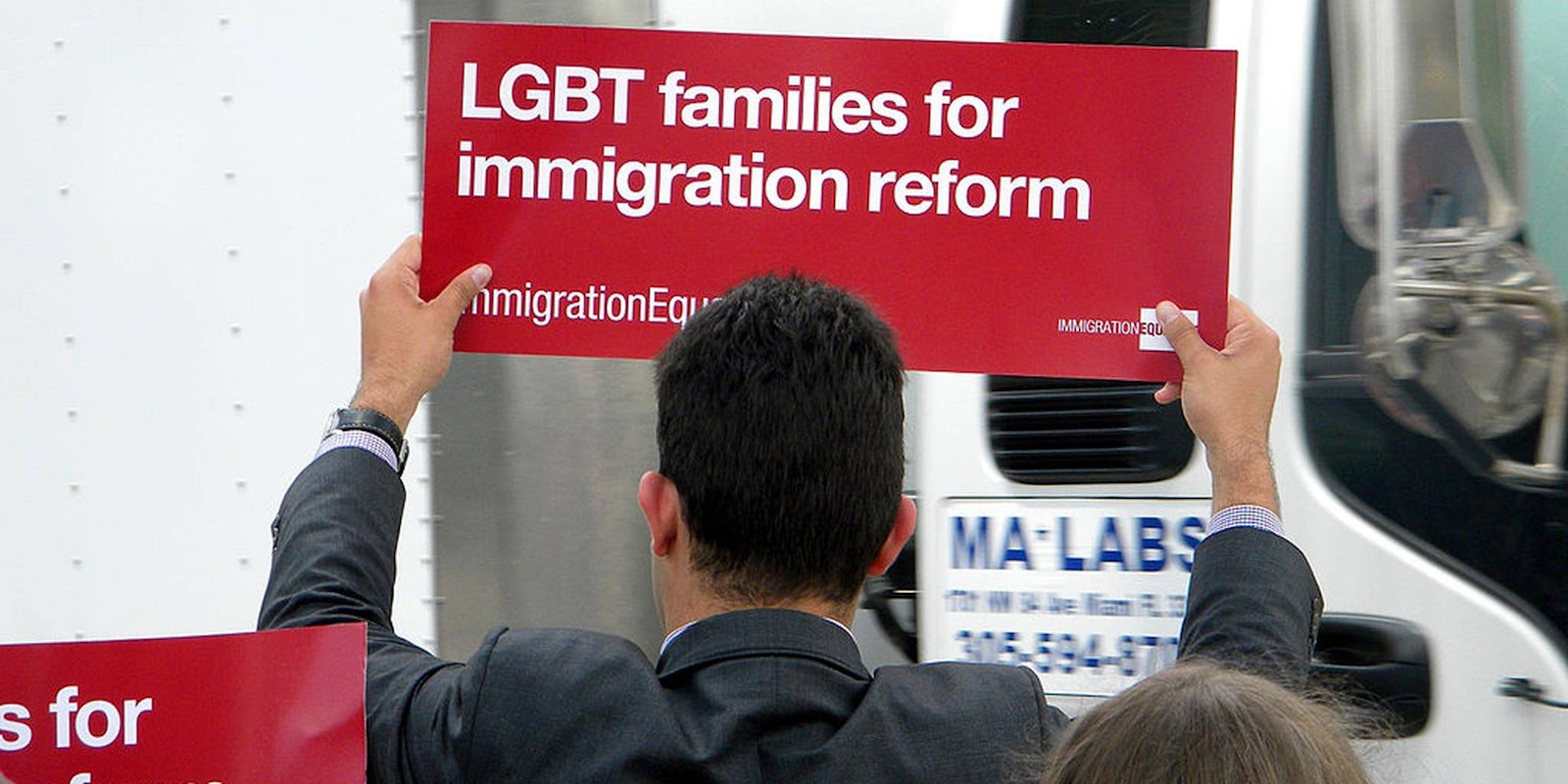On Monday, the Supreme Court heard arguments in a case that holds the power to destroy or enrich millions of undocumented immigrants’ lives—including the roughly 200,000 LGBT immigrants who currently lack legal status.
The case of United States v. Texas is a highly politicized conservative attempt at shutting down President Obama‘s executive action on immigration. In 2014, Obama signed an order expanding the Deferred Action for Childhood Arrivals (DACA) program and creating the new Deferred Action for Parents of Americans and Lawful Permanent Residents (DAPA) program, both designed to keep mixed-status families (where some family members are U.S. citizens and some are undocumented immigrants) together.
A Texas district court issued a stay against both DACA and DAPA in early 2015 amid conservative outcry and allegations that executive action on immigration is illegal. Now, with the case at the Supreme Court, the Department of Justice is fighting alongside dozens of civil rights and immigrant advocacy groups to try and get the stay lifted.
For binational LGBT couples, legally attaining a marriage visa remains difficult. This is despite the Supreme Court’s 2015 marriage equality ruling and especially true if one-half of the couple was already deported during the DOMA years. In some cases, U.S. citizens have been forced to leave the country in order to live with their partners—like when famed journalist Glenn Greenwald moved to Brazil because his boyfriend David Miranda could not get a visa.
That’s just one of the layered and unique complications faced by LGBT immigrants. For lesbians, gay men, bisexuals, and transgender people living in the roughly 80 international countries where being LGBT is punishable by death or criminalized, America represents a place of asylum, community, and family.
Among the briefs filed in the Supreme Court case is an extensive explainer on how immigration policy affects LGBT people. Filed by the National Queer Asian Pacific Islander Alliance, the brief is co-signed by some of the nation’s most powerful LGBT advocacy groups, like PFLAG, the National LGBTQ Task Force, the National Center for Transgender Equality, and the Transgender Law Center, as well as issue-specific groups like Immigration Equality and Familia: Trans Queer Liberation Movement.
Victoria Rodriguez-Roldan, the Trans/Gender Non-Conforming Justice Project director at the National LGBTQ Task Force, told the Daily Dot that “immigration is an LGBTQ issue.”
“LGBT people, especially in the trans community, are much more likely to be arrested or be the victims of crime or assault and to live in poverty,” said Rodriguez-Roldan. Those problems are only compounded by undocumented status—leaving immigrants without a legal means of income, and instead with a fear of police and facing immigration detention conditions that have been proven especially unsafe for LGBT immigrants.
In March, three dozen members of Congress sent a letter to the Department of Homeland Security criticizing the treatment of LGBT detainees at ICE facilities. The action was spurred in part by a Human Rights Watch study finding that more than half of transgender women in immigration detention are housed with men, where they are vulnerable to rape, assault, and harassment.
Rodriguez-Roldan stressed the fact that U.S. v. Texas would not directly affect some of the unique obstacles faced by LGBT undocumented immigrants. It would not create more appropriate housing for trans women in detention, it would not bring pre-marriage equality deported couples back together, and it would not expand the definition of family to include the chosen families that so many LGBT people depend on if rejected by families of origin.
“It underscores the need to go further, and the fact that this is just one step,” said Rodriguez-Roldan. “But this case does affect people who are applying for asylum and who face their lives being in danger if they are deported.”
Rodriguez-Roldan explained that many undocumented LGBT immigrants don’t realize that they are supposed to apply for asylum within one year of arriving in the U.S., and they end up being deported back to dangerous situations in their home countries because of paperwork rules, even when they otherwise fit the asylum criteria.
According to Immigration Equality Executive Director Aaron C. Morris, the Supreme Court’s decision in U.S. v. Texas is a life-or-death issue.
“The Supreme Court’s decision could defer the deportation of as many as 4 million immigrants who have lived in limbo far too long,” said Morris in a statement emailed to the Daily Dot. “Thousands of these individuals will be lesbian, gay, bisexual, transgender, queer, and HIV-positive. For them, deportation to one of the nearly 80 countries around the world that criminalize them could be a death sentence.”
The threat of violence at home, complicated partnership status, and other issues can make immigration extra daunting for LGBT people. But sometimes, it’s a simple as being one of the millions of “DREAMers” born in the U.S. to undocumented parents.
According to a data analysis by the Center for American Progress, more than 6 million people living in the U.S. live with a family member who faces deportation if the Supreme Court rules against the DACA and DAPA expansions.
“This case will affect tens of thousands of LGBT immigrants, including many LGBT youth who have lived in the U.S. since they were small children,” said National Center for Lesbian Rights Legal Director Shannon Minter in a statement emailed to the Daily Dot. “This is a vital part of our community, and one that deserves much more attention and advocacy.”


